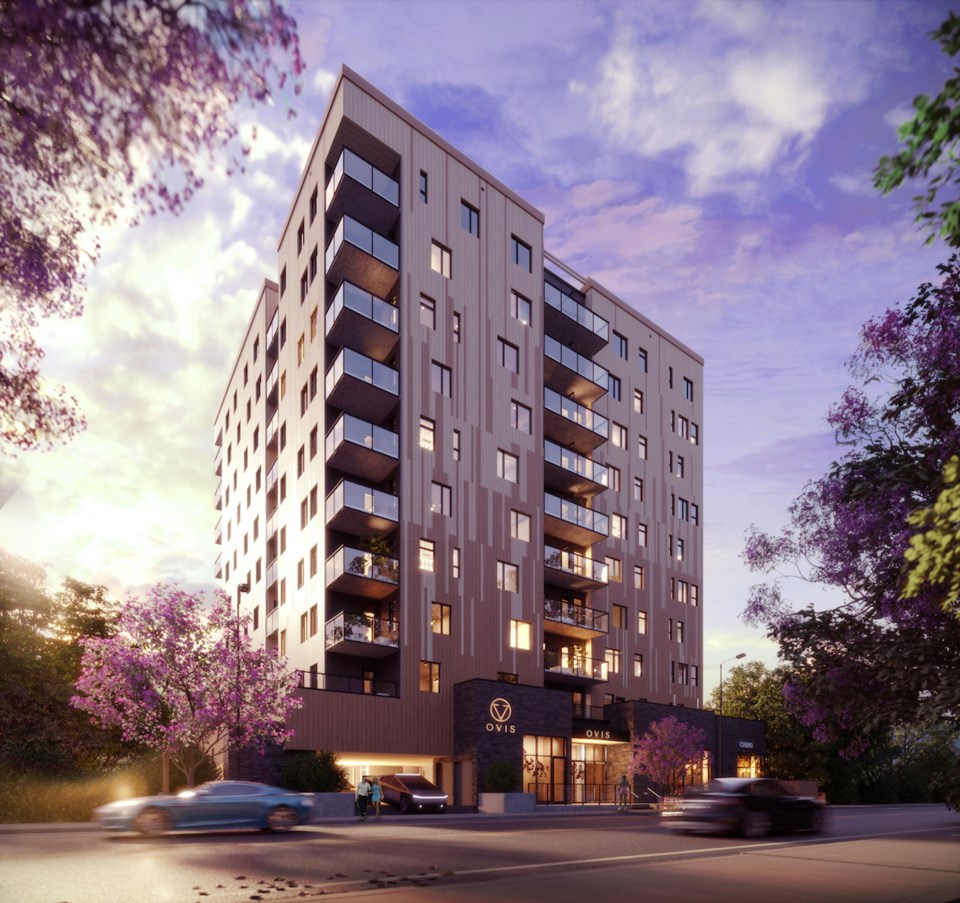Those looking for a vision of what the future of housing in B.C. could look like if the legislature passes a suite of bills aimed at encouraging affordable, resilient housing might want to take a look at a project that broke ground in Langford this week.
Ovis One is an 80-unit strata-titled project at 2826 Jacklin Road, the first phase of a project Ovis Group of Vancouver is developing in the community. Units in the 10-storey concrete tower will be fully furnished and air-conditioned, a key feature as B.C. faces hotter days more often each summer.
Moreover, it’s situated on rapid transit and near a new $98 million post-secondary campus that will attract a sizeable student population – one of the key groups needing the affordable accommodation all levels of government want to see built.
“Affordability for homeownership is really out of reach for most people right now,” said Mary Wagner, acting mayor of Langford who represented the city at the event. “Rental’s become absolutely critical for everyone, students and literally everyone.”
High financing costs are also a hurdle for developers, however. Several projects in the province have been put on hold as developers reassess their options. The sharp rise in interest rates over the past 18 months – steeper, in relative terms, and more persistent than the jump that dashed fortunes in 1981 – has refocused many on simply staying afloat.
“We have loans that we underwrote at 2.5, 3 per cent which are now under water. Our clients can’t refinance that,” Gagan Lalli, vice-president, real estate finance with CMLS Financial in Vancouver told commercial real estate association NAIOP on Nov. 16. “Some of our clients have issues because they now have to turn out a loan that they no longer qualify for.”
This is where a new lending program the Canada Mortgage and Housing Corp. launched last year, MLI Select, is playing a key role.
MLI Select has low-equity requirements and provides extended amortizations on financing for projects that meet certain affordability, efficiency and accessibility goals.
“[It] has quite frankly saved a lot of people’s bacon. It has made projects work that would otherwise not work,” Lalli said. “Fifty-year amortizations is one way to offset interest rates, which no conventional lender will do, but with the government backing it will get done.”
Lalli said MLI Select accounts for about 70 to 80 per cent of its rental financing business right now, helping projects such as Ovis One move forward.
In parts of the country such as Alberta and Quebec, where rents haven’t spiralled beyond reach of local incomes despite low vacancies, many developers qualify on the basis of affordability criteria alone.
But in Langford, Ovis One has met a broad array of criteria to qualify.
“We decided to go all-in with the three items – affordability, efficiency and accessibility,” said Sébastien Leboeuf, CEO of Ovis Group.
The project is 25 per cent more energy efficient than building code requirements, and 15 per cent of units feature adaptive and universal design elements to ensure accessibility.
Most important from a financial perspective, eight one-bedroom units are designated non-market housing with rents that will reflect CMHC affordability thresholds for a period of 10 years. CMHC currently sets an affordable rent for the units at $1,223 a month.
“A one-bedroom apartment in a highrise condo is worth $2,100, so we are giving a real credit – close to $1 million based on 10 years,” Leboeuf said. “But we’re still doing it because at the end of the day we think it’s important to have 10 per cent of our units considered affordable.”
While the project was built as a strata-tiled development, Ovis has no plans to sell the units. Strata titling was a requirement of the city, but Ovis sees the project as an income producing property.
It also plans a second project in downtown Victoria, for which it’s also seeking MLI Select financing from CMHC.
Changes to the program earlier this year triggered a flood of applications that has more than doubled the wait time for approval of the financing needed to start construction but Leboeuf is optimistic.
“From the day you start till the day you have a tenant in, it’s like four years – and we’re considered quite fast as a developer,” he said. “In the best world, I would like to see all these things work in under a year because it’s quite a lot of time.”



